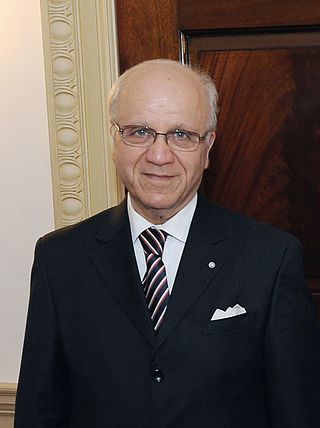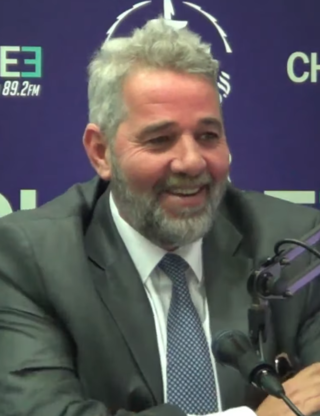| Formation | 27 December 2017 |
|---|---|
| Headquarters | Algiers, Algeria |
Membership | 50 members known as les immortels (the immortals) |
Perpetual Secretary | Abdelaziz Bouteflika |
| Website | el-mouradia.dz |
The Algerian Academy of the Amazigh Language is the pre-eminent Algerian council for matters pertaining to the Amazigh language (also known as the Berber language). The academy was officially established on December 27, 2017, by the former president of Algeria Abdelaziz Bouteflika.
The President of Algeria Abdelaziz Bouteflika before the Council of Ministers meeting on 27 December 2017, had mandated its Prime Minister Ahmed Ouyahia to implement the directives issued. [1]
Thus, Ahmed Ouyahia had convened and chaired an interministerial council on January 8, 2018, devoted to the revitalization of Tamazight's teaching and the preparation of the organic bill for the creation of an Algerian Academy of the Amazigh language. [2]
This interministerial council had resulted in a series of measures, including the allocation of additional budget posts, to strengthen the teaching of Tamazight in the Algerian education system, and to expand training and research in Tamazight at the level of Algerian universities. [3]
In addition, an interministerial working group would be set up at the Prime Minister's Office to work on the preparation of a draft bill for the creation of this Language Academy. [4]
This text will follow the usual course at the level of the Government and the Council of Ministers before reaching the Algerian Parliament in the first half of 2018. [5]

Tifinagh is a script used to write the Berber languages. Tifinagh is descended from the ancient Libyco-Berber alphabet. The traditional Tifinagh, sometimes called Tuareg Tifinagh, is still favored by the Tuareg Berbers of the Sahara desert in southern Algeria, northeastern Mali, northern Niger, and northern Burkina Faso for writing the Tuareg Berber language. Neo-Tifinagh is an alphabet developed by Berber Academy to adopt Tuareg Tifinagh for use with Kabyle; it has been since modified for use across North Africa.

Ahmed Ouyahia is an Algerian politician who was Prime Minister of Algeria four times. A career diplomat, he also served as Minister of Justice, and he was one of the founders of the Democratic National Rally (RND) as well as the party's secretary-general. He is considered by Western observers to be close to the military of Algeria and a member of the "eradicator" faction in the 1990s civil war against Islamist militants. Ouyahia resigned as prime minister in March 2019 following President Bouteflika's announcement that he would not seek reelection, and Ouyahia was arrested in June 2019 for crimes related to corruption. He was later convicted and is currently serving 19 years in jail.

Abdelaziz Belkhadem is an Algerian politician who was Prime Minister of Algeria from 2006 to 2008. He was also Secretary-General of the National Liberation Front (FLN). Belkhadem served as Minister of Foreign Affairs from 2000 to 2005 and Personal Representative of President Abdelaziz Bouteflika from 2005 to 2006; after serving as Prime Minister from 2006 to 2008, he was again appointed as Personal Representative of the Head of State in 2008.

Kabyle or Kabylian is a Berber language (tamazight) spoken by the Kabyle people in the north and northeast of Algeria. It is spoken primarily in Kabylia, east of the capital Algiers and in Algiers itself, but also by various groups near Blida, such as the Beni Salah and Beni Bou Yaqob.

The Kabyle people are a Berber ethnic group indigenous to Kabylia in the north of Algeria, spread across the Atlas Mountains, 160 kilometres (100 mi) east of Algiers. They represent the largest Berber population of Algeria and the second largest in North Africa.
Education in Algeria is free and compulsory for Algerians from the ages of 6 to 15. However, only half of Algerian students are enrolled in secondary schools. As of 2015, Algeria has 92 post-secondary institutions, which includes 48 universities.

Oriental région or Oujda region is one of the twelve regions of Morocco, located in the north-eastern part of the country. It covers an area of 90,127 km2 and has a population of 2,314,346 and is the easternmost region of Morocco.

The Black Spring was a series of protests and political demonstrations by Kabyle activists in the Kabylie region of Algeria in 2001, which were met by repressive and violent police measures and became a potent symbol of Kabyle discontent with the national government. The protests took place against a backdrop of long-standing cultural marginalization of the Highlander Kabyle, a homogeneous Berber linguistic group in Algeria despite the most rigid government-sponsored Arabization measures of the 1960s through the 1980s having been lifted. The name "Black Spring" alludes to the events known as the Berber Spring of the 1980s, in which mainly Kabyle civil society activists challenged the ban on Berber culture then in place, demanding cultural rights and democracy.

Mourad Medelci was an Algerian politician who served in the government of Algeria as Minister of Foreign Affairs from 2007 to 2013. He was President of the Constitutional Council of Algeria from 2013 until his death in 2019.
The Haut commissariat à l'amazighité is a government department in Algeria overseeing the Berber (Amazigh) sphere.

Parliamentary elections were held in Algeria on 10 May 2012. The incumbent coalition, consisting of the National Liberation Front (FLN) of President Abdelaziz Bouteflika and the National Rally for Democracy (RND) of Prime Minister Ahmed Ouyahia, held on to power after winning a majority of seats. The Islamist parties of the Green Algeria Alliance lost seats.

Abdelmalek Sellal is an Algerian politician who was Prime Minister of Algeria from 3 September 2012 to 13 March 2014 when he took a leave of office to support President Abdelaziz Bouteflika's re-election campaign and again from April 2014 to May 2017.

Yennayer is the first month of the Berber calendar. The first day of Yennayer corresponds to the first day of January in the Julian Calendar, which is shifted thirteen days compared to the Gregorian calendar, thus falling on 12 January every year. The Berber calendar was created in 1980 by Ammar Negadi, a Paris-based Algerian scholar. He chose 943 BC, the year in which the Meshwesh Shoshenq I ascended to the throne of Egypt, as the first year of the Berber calendar.
Events in the year 2017 in Algeria.

Abdelmadjid Tebboune is an Algerian politician currently serving as the President of Algeria since December 2019 and as Minister of Defence.
Events in the year 2018 in Algeria.

The 2019–2021 Algerian protests, also called Revolution of Smiles or Hirak Movement began on 16 February 2019, six days after Abdelaziz Bouteflika announced his candidacy for a fifth presidential term in a signed statement. These protests, without precedent since the Algerian Civil War, were peaceful and led the military to insist on Bouteflika's immediate resignation, which took place on 2 April 2019. By early May, a significant number of power-brokers close to the deposed administration, including the former president's younger brother Saïd, had been arrested.

A constitutional referendum was held in Algeria on 1 November 2020. The subject of the referendum was a revision of the Algerian constitution, and it follows a series of protests known as Hirak.
Fodil Mezali is an Algerian journalist, editor-in-chief and managing editor.

Sid Ahmed Ferroukhi was an Algerian politician.